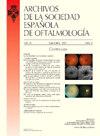Williams-Beuren综合征中中央斑块和中角膜厚度减少的病例系列
Q3 Medicine
Archivos De La Sociedad Espanola De Oftalmologia
Pub Date : 2025-05-01
DOI:10.1016/j.oftal.2024.11.009
引用次数: 0
摘要
背景/目的分析伊斯坦布尔医科大学眼科诊所3例Williams-Beuren综合征(WBS)的眼部体征。方法对3例确诊为WBS的患者在伊斯坦布尔医科大学眼科进行了全面的眼科检查,包括最佳矫正视力、裂隙灯生物显微镜、眼底扩张检查、光学相干断层扫描、角膜地形图和眼底彩色成像。结果3例患者最佳矫正视力均下降,SD-OCT检查中ILM-RNFL厚度下降,视网膜内层持续存在,角膜中央厚度下降,但上皮厚度测量正常,眼底检查视网膜小动脉弯曲。结论wbs是一种复杂的多系统遗传病。这些病例的眼部表现为角膜厚度减少,上皮厚度正常,ILM-RPE厚度减少,视网膜小动脉扭曲,这可能为WBS中含有弹性蛋白基因的染色体7q11.23微缺失影响全身血管的表现提供未来的见解。本文章由计算机程序翻译,如有差异,请以英文原文为准。
Serie de casos del síndrome de Williams-Beuren con disminución de la fóvea central y del espesor corneal central
Background/aims
To characterize the ocular signs of Williams-Beuren syndrome (WBS) in 3 cases examined at Istanbul Medipol University Ophthalmology Clinic.
Methods
Three patients with a diagnosis of WBS underwent comprehensive ophthalmic evaluation at the Istanbul Medipol University Ophthalmology, including best-corrected visual acuity, slit-lamp biomicroscopy, dilated fundus examination, optical coherence tomography, corneal topography and colour fundus imaging.
Results
All 3 cases had decreased best corrected visual acuity, decreased ILM-RNFL thicknesses with a persistence of inner retinal layers on the SD-OCT examinations, decreased central corneal thickness yet normal epithelial thickness measurements and retinal arteriolar tortuosity in fundus examination.
Conclusion
WBS is a complex multisystem genetic disorder. The ocular findings observed in these cases which are decreased corneal thickness with normal epithelial thickness, decreased ILM-RPE thicknesses, and retinal arteriolar tortuosity may provide future insight into systemic vascular findings affected by a microdeletion of chromosome 7q11.23 which also contains elastin gene in WBS.
求助全文
通过发布文献求助,成功后即可免费获取论文全文。
去求助
来源期刊

Archivos De La Sociedad Espanola De Oftalmologia
Medicine-Ophthalmology
CiteScore
1.20
自引率
0.00%
发文量
109
审稿时长
78 days
期刊介绍:
La revista Archivos de la Sociedad Española de Oftalmología, editada mensualmente por la propia Sociedad, tiene como objetivo publicar trabajos de investigación básica y clínica como artículos originales; casos clínicos, innovaciones técnicas y correlaciones clinicopatológicas en forma de comunicaciones cortas; editoriales; revisiones; cartas al editor; comentarios de libros; información de eventos; noticias personales y anuncios comerciales, así como trabajos de temas históricos y motivos inconográficos relacionados con la Oftalmología. El título abreviado es Arch Soc Esp Oftalmol, y debe ser utilizado en bibliografías, notas a pie de página y referencias bibliográficas.
 求助内容:
求助内容: 应助结果提醒方式:
应助结果提醒方式:


